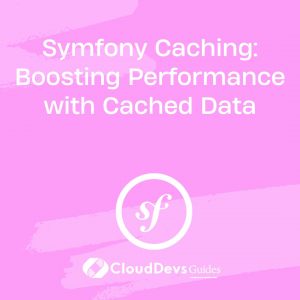Courses and Certifications to Master Symfony in 2023
Symfony has emerged as a prominent framework for a wide range of applications and has gained widespread acceptance among businesses of all sizes. Symfony enables developers to efficiently create robust applications, and the demand for Symfony developers is consistently increasing.
Table of Contents
If you are passionate about enhancing your Symfony programming skills or starting a career in Symfony development, considering certification programs or enrolling in relevant courses can provide substantial advantages. In this article, we will explore some of the top Symfony certification options and courses available in 2023.
1. Symfony PHP Framework Tutorial – Full Course by freecodecamp.org
The Symfony PHP Framework Tutorial – Full Course by freecodecamp is a free online course that teaches you the basics of Symfony and how to build a CRUD (create, read, update, delete) web app with Symfony and Doctrine. The course is suitable for beginners who want to learn how to use Symfony, a PHP web framework that provides a set of reusable components and tools to help developers create complex and high-performance web applications.
The course has 4 hours of video content and covers the following topics in each video:
- Installing the development tools: This module teaches you how to install the necessary tools for developing with Symfony, such as PHP, Composer, and Symfony.
- Installing Symfony: This module shows you how to install and configure Symfony, using the Symfony command line tool and web browser console.
- Console: This module explains how to use the Symfony console to create and manage your Symfony projects, such as generating controllers, entities, forms, and migrations.
- Generating a controller: This module demonstrates how to generate a controller, using the make:controller command and creating a controller class.
- Routing: This module covers how to use routing in Symfony, using annotations, YAML, or XML to define routes and match them to controller actions.
- Using the Symfony Server: This module teaches you how to use the Symfony server, using the server:start and server:stop commands to run and stop the local web server.
- Twig: This module introduces you to Twig, the templating engine used by Symfony to create and render views, using variables, filters, functions, and tags.
- Doctrine: This module guides you on how to use doctrine, and the ORM (object-relational mapping) used by Symfony to create and use entities, repositories, and migrations.
- Flash messages: This module shows you how to use flash messages, using the addFlash method to display success or error messages to the user.
- Symfony bug: This module explains how to use the Symfony debug toolbar and profiler to inspect and debug your Symfony app.
- Security: This module teaches you how to use the security bundle to implement user authentication and authorization, using the make: user, make: auth, and make:registration-form commands to create user entities, login forms, and registration forms.
- Registration page: This module demonstrates how to create a registration page, using the make:registration-form command and creating a registration form class.
- More Doctrine and Relationships: This module covers how to use doctrine annotations to define associations between entities, such as one-to-many, many-to-one, and many-to-many.
- File uploading: This module shows you how to use the VichUploaderBundle to handle file uploads and store them in the database.
- Defining custom parameters: This module teaches you how to use the parameters.yml file to store and access custom parameters in your Symfony app.
- Doctrine relationship: This module explains how to use the doctrine query builder to create and execute complex queries on your entities.
- QueryBuilder: This module demonstrates how to use the query builder to create and execute complex queries on your entities.
- Services: This module guides you on how to use services, using the service container to manage and inject services in your Symfony app, and using the autowire and autoconfigure options to simplify service registration.
- Deployment: This module shows you how to deploy your Symfony app to the web, using the Heroku platform, the Heroku create and git push heroku master commands to create and push your app to Heroku.
You can enroll in the course by visiting the course page. You can also see the course syllabus, reviews, and previews on the YouTube website.
2. Up and Running with Symfony 4 by CodeCourse
Up and Running with Symfony 4 by Codecourse is a paid online course that teaches you how to use Symfony 4 to create a blog application. You will learn how to use the Symfony command line tool, how to use the Symfony flex structure, how to use the twig templating engine, how to use the maker bundle, how to use the doctrine migrations, how to use the security bundle, how to use the easy admin bundle, and how to use the encore web pack.
The course is suitable for intermediate developers who want to learn how to use Symfony 4, a PHP web framework that provides a set of reusable components and tools to help developers create complex and high-performance web applications.
The course modules are:
- Introduction: This module introduces you to the course objectives, the instructor, and the prerequisites. You will also learn what is Symfony, what this course will cover, who this course is for, why to use Symfony and the key technologies in Symfony.
- Setup: This module shows you how to set up Symfony 4, using the Symfony command line tool to create and manage your Symfony projects, such as generating controllers, entities, forms, and migrations. You will also learn how to use the Symfony flex structure, which is a new way of managing dependencies and configuration in Symfony 4.
- Blog UI: This module teaches you how to create the blog UI, using the Twig templating engine to create and render views, using variables, filters, functions, and tags. You will also learn how to use the Bootstrap 4 frameworks to style your app, and how to use the encore web pack to manage and compile your assets, such as CSS, JavaScript, and images.
- Blog functionality: This module covers how to create the blog functionality, using the doctrine ORM (object-relational mapping) to create and use the database, using the maker bundle to create and use entities, repositories, and migrations, using the security bundle to implement user authentication and authorization.
- Deployment: This module guides you on how to deploy your Symfony app to the web, using the Heroku platform, using the Heroku create and git push heroku master commands to create and push your app to Heroku. You will also learn how to use the Heroku config command to set up your environment variables, such as the database URL, and how to use the Heroku run command to run commands on your Heroku app, such as the doctrine migrations.
This course covers up to 3 hours of on-demand recorded lecture videos.
3. Symfony API Platform with React Full Stack Masterclass by Udemy
The Symfony API Platform with React Full Stack Masterclass is a comprehensive course available on Udemy. It is designed to help you create a robust REST API in Symfony using API Platform and build a React Single-Page Application (SPA). The course was created by Piotr Jura and has received a rating of 4.0 from 1,104 students. The course is available in English and French.
This course contains 22 different sections, and the main four course modules are;
- Introduction to Symfony and API Platform: This module provides an overview of the Symfony framework and introduces you to API Platform, a powerful set of tools for building APIs with Symfony.
- Creating a REST API with API Platform: In this module, you will learn how to create a robust REST API using API Platform. you will explore topics such as data models, serialization, validation, and authentication.
- Building a React Single-Page Application (SPA): This module focuses on building a modern React Single-Page Application (SPA) that consumes the REST API you created in the previous module. you will learn about React components, state management with Redux, and form handling with Redux-Form.
- Advanced Topics and Best Practices: The final module covers advanced topics and best practices for working with Symfony, API Platform, and React. you will dive deeper into topics such as performance optimization, testing, deployment, and security.
The course is highly recommended by learners and has been selected as one of the top-rated courses trusted by businesses worldwide. At the end of this course, you will receive a certificate of completion from Udemy.
4. Symfony 5 – The Complete Guide for Beginners by Udemy
The Symfony 5 – The Complete Guide for Beginners course is offered by Udemy. This course is designed to teach you the PHP framework Symfony from scratch. The course covers all the core components of the framework, including installation and setup, routes, controllers, and views. You will also learn how to use the Symfony Console, Composer, and Symfony Flex. The course is taught in English and Spanish and has a rating of 4.5 out of 5 stars from over 300+ students.
The course modules are;
- Introduction: This module provides an overview of the course, including what to expect and why Symfony is a valuable framework to learn. It also introduces the source code used throughout the course.
- Preparation: This module covers an overview of the tools you will be using, along with installation and setup instructions for both Windows and Linux. It also includes a Frequently Asked Questions (FAQ) section to address common queries.
- Getting started with Symfony: Here, you will dive into Symfony by exploring its project structure, understanding the Symfony Console for command-line tasks, and learning about Symfony Flex, a tool for managing Symfony applications.
- Symfony core components: This module covers the essential core components of Symfony. It begins with setting up an editor for coding, followed by explanations of controllers, routing for handling URLs, working with views in Symfony, using Twig Templates for rendering views, integrating Doctrine for database management, creating entities, and includes a quiz.
- The web project: In this extensive module, you will build a web project using Symfony. The journey starts with creating the first web page, utilizing the Symfony Server, and incorporating Twig and Bootstrap CSS for front-end development.
By the end of this course, you will get to know about the core components and the project structure of the framework. You will also learn about the routes and views in Symfony with the Twig template engine.
5. Symfony Web Development Complete Guide: Beginner to Advanced by Udemy
The “Symfony Web Development Complete Guide: Beginner To Advanced” course is offered by Udemy. This course is designed to teach you the Symfony PHP framework from theory to advanced level. By the end of this course, you will be able to create both simple websites and complex dynamic web applications using Symfony. The course has a rating of 4.5 out of 5 stars from over a thousand students’ ratings.
This course includes 26 individual sections, adding up to a total of 312 lectures of 24 hours and 20 minutes.
- Introduction: In this introductory module, you will receive a warm welcome to the course and gain insights into Symfony, including the tools and requirements you will need as a student.
- Symfony 4 and 5 basics, installation, and configuration: This module delves into the fundamentals of Symfony, starting with the installation and system requirements for Symfony 4. You will also explore Symfony 4 configuration, the use of Symfony Flex for library installation, and gain insights into request and response objects, along with the HTTP processing workflow.
- Symfony 4 and 5 core components: Here, you will dive deep into the core components of Symfony. Topics covered include routing for handling URLs, creating controllers, utilizing Twig for views in Symfony, working with HTML forms, understanding Doctrine ORM for database management, defining entities (models) and their relationships, exploring the service container, and mastering dependency injection through auto wiring in Symfony.
- Console command, events, sessions, and cookies: This module introduces essential Symfony features, such as console command creation, event handling with listeners, and managing sessions and cookies within Symfony applications.
- Sending emails, translations, and security concepts: Learn to send emails effectively within Symfony, explore translation capabilities, and gain an understanding of key security concepts related to Symfony, including user login and registration.
- Unit and functional testing, debugging, and cache: Discover best practices for unit and functional testing, debugging Symfony applications, and optimizing performance using caching mechanisms.
- Doctrine table inheritance, deployment, and external APIs: This module covers advanced topics, including using Doctrine for table inheritance and polymorphic database queries. you will also learn how to deploy a Symfony application to Heroku and integrate external APIs, such as the Vimeo API, into your Symfony application.
- Creating websites and web applications in Symfony: Explore the practical aspect of creating your websites and web applications using the Symfony framework, applying the knowledge gained throughout the course.
- Basics of RabbitMQ message broker, Messenger Component, and CQRS pattern: Get introduced to RabbitMQ as a message broker, delve into the Messenger Component in Symfony, and grasp the principles of the CQRS pattern, focusing on command query responsibility segregation.
- REST API with Symfony and API Platform: Finally, learn to build RESTful APIs using Symfony and the API Platform, a valuable skill in modern web development.
Here is a comparison table of the five Symfony courses mentioned above.
| Course/ program | Cost | Level | Duration | Study mode |
|---|---|---|---|---|
| Symfony PHP Framework Tutorial - Full Course | Free | Beginner | 4 hours | Online |
| Up and Running with Symfony 4 | $19.99 | Beginner / Intermediate | 3 hours | Online |
| Symfony API Platform with React Full Stack Masterclass | $64.99 | Intermediate | 19.5 hours | Online |
| Symfony 5 - A Complete Guide for Beginners | $74.99 | Beginner / Intermediate | 7 hours | Online |
| Symfony Web Development Complete Guide: Beginner to Advanced | $69.99 | Beginner / Intermediate / Advanced | 24 hours | Online |
The above table depicts that there are differences in each course according to the duration, costs, and skill requirements to complete the course. As you have noticed, some courses might be expensive, while some are free of charge and are tailored for individuals with intermediate and advanced skills. When you are choosing a Synfony course, check for your skill level, financial limitations, and career goals. This way, you will be able to find the best Synfony course suitable for you.
Conclusion
Know that taking a Synfony course in 2023 is a great way to enhance your career opportunities. By receiving the appropriate training, you can improve your expertise as a Symfony developer and engage in thrilling projects. Regardless of whether you are a beginner or an experienced programmer, various courses and certification programs can help you enhance your skills.
Table of Contents






